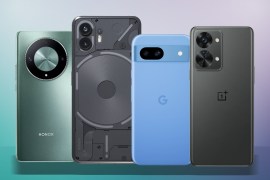Best fitness trackers in 2025 including Fitbit, Garmin, Whoop and more
Find the best fitness tracker for runners, swimmers, cyclists, and anyone tracking health stats like steps, calories, and sleep
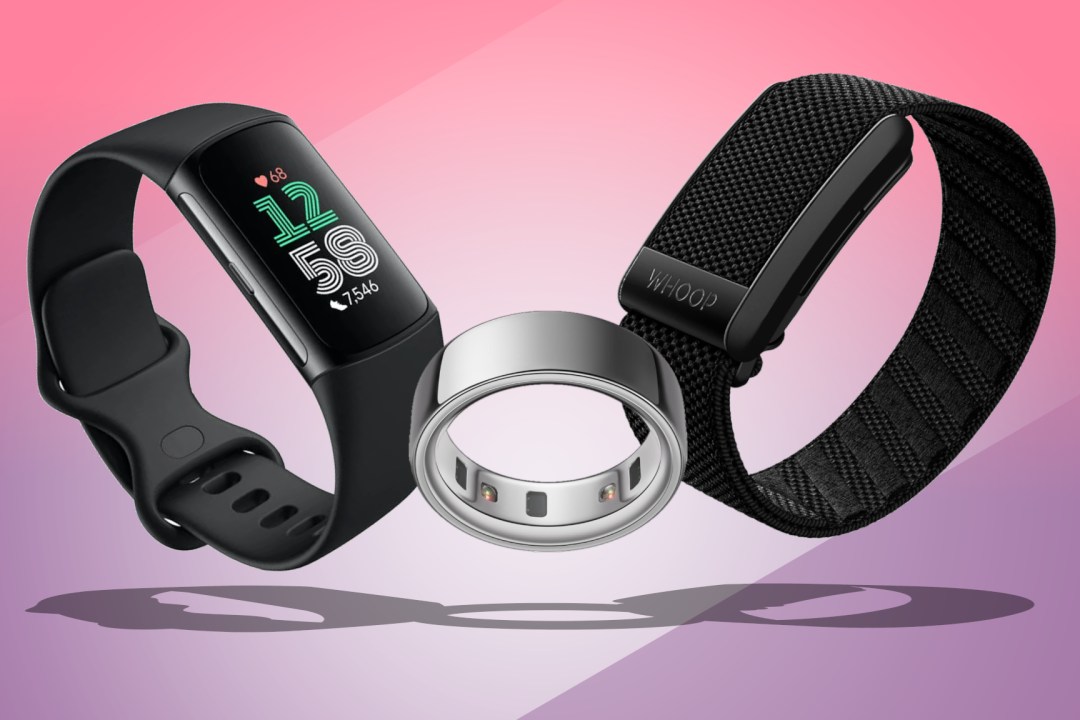
Looking for one of the best fitness trackers? Whether you’re training for a marathon, working on your overall fitness, or just want an easy way to track your daily steps, calories burned, heart rate, and sleep data, there’s a fitness tracker that’s perfect for you.
With so many options available, choosing the right one can be overwhelming. Some models focus on in-depth health metrics like blood oxygen levels and stress tracking, while others keep things simple with step counting and heart rate monitoring. There are premium smartwatches packed with advanced fitness features and budget-friendly options that still offer excellent tracking capabilities.
Fortunately, we’ve done the hard work for you by rounding up some of the best fitness trackers to suit every budget and lifestyle. Whether you prefer something sleek and stylish or rugged and durable, there’s a device that matches your needs.
Now, sit back, relax, and imagine all those calories you’re about to burn! With the right fitness tracker on your wrist, staying motivated and reaching your health goals has never been easier. Let’s find the perfect one for you.
Why you can trust Stuff: Our team of experts rigorously test each product and provide honest, unbiased reviews to help you make informed decisions. For more details, read how we test and rate products.
Quick list: what’s the best fitness tracker?
We think the Fitbit Charge 6 (buy now) is the best fitness tracker for most people today. Combining a large screen, svelte design, and advanced health-tracking capabilities like stress management, it ticks all the main boxes (including GPS), for a reasonable price.
The Xiaomi Mi Band 9 (buy now) is an amazing budget option for those looking for a worry-free fitness tracking experience that won’t break the bank.
The Whoop (buy now) is a premium fitness tracker designed for serious athletes, offering 24/7 strain, recovery, and sleep tracking—with no screen, a sleek design, and in-depth analytics to optimise performance.
The Garmin Vivosmart 5 (buy now), with is lightweight design might be forgettable, but if you can deal with the dinky screen and lack of built-in GPS, the Vivosmart 5 offers a lot of tracking smarts for a relatively affordable price
The Fitbit Inspire 3 (buy now) is comfortable and comes with a new colour screen. It’ll make you question whether you need to spend any more money.
The Withings ScanWatch (buy now) is a fitness tracker for analogue watch fans, the subtle ScanWatch will track everything from steps to oxygen saturation and ECG.
The Oura (buy now) is a ring which manages to cram all the fitness tracking features most people need within its minuscule body. Comfortable enough to sleep in and for all-day wear, it’s perfect for those who would rather have a traditional watch without sacrificing fitness tracking abilities.
The best fitness trackers you can buy today:
Best fitness tracker overall
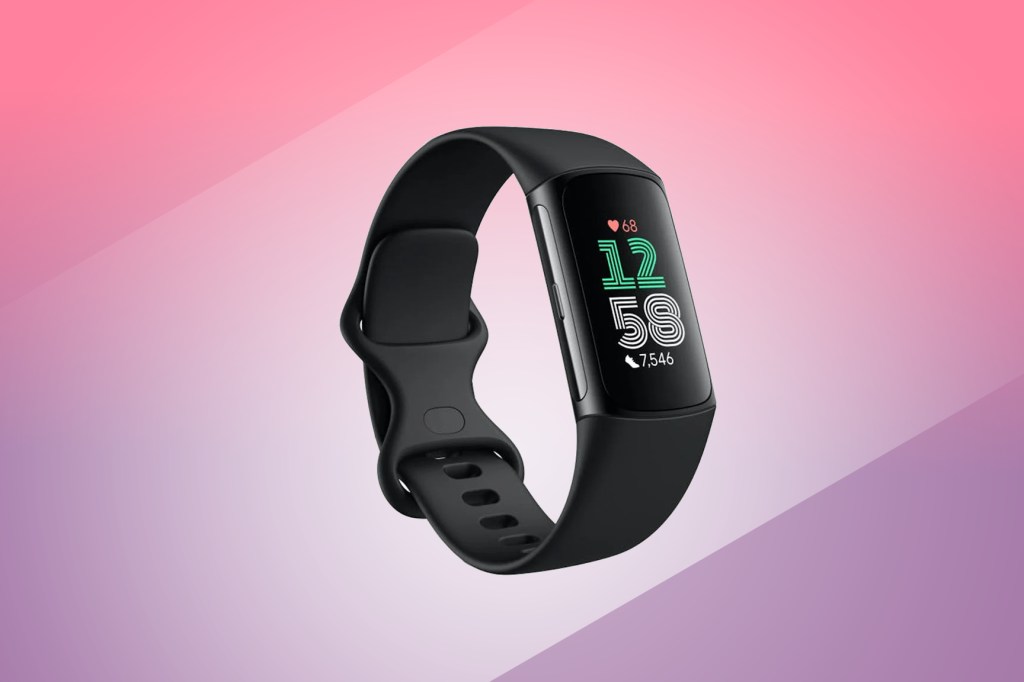
1. Fitbit Charge 6
Stuff Verdict
Combining a large screen, svelte design, and advanced health-tracking capabilities like stress management, the Fitbit Charge 6 ticks all the main boxes (including GPS), for a reasonable price.
Pros
- Finally gets a screen upgrade
- Comfortable to wear 24/7 and solid heart rate monitoring
- Easy to use interface
Cons
- Data insights locked behind Fitbit Premium
- Iffy sports tracking accuracy
| Fitbit Charge 6 specs | |
|---|---|
| Screen | 1.04in AMOLED always-on colour touchscreen |
| Battery life | Up to 7 days |
| Water resistance | 50m / 160ft |
| GPS | GPS + GLONASS |
| Sensors | ECG, SpO2, Ambient light, Optical heart rate |
| Compatibility | Android, iOS |
| Weight | 30g / 1 oz |
We think the Fitbit Charge 6 is easily one of the best fitness trackers available, blending a sleek, stylish design with advanced health-tracking features. It offers stress management, sleep tracking, and continuous heart rate monitoring – essential tools for anyone looking to take their fitness and well-being seriously.
One of its standout features is built-in GPS, which allows for precise tracking of outdoor activities like running, cycling, and hiking without needing to carry your phone. During testing, we found its GPS accuracy to be impressive, making it a great companion for those who love exercising outdoors. Battery life is another strong point, lasting up to seven days on a single charge, so you don’t have to worry about constantly recharging.
The Charge 6 is also highly versatile, with seamless compatibility across both iOS and Android devices. It integrates well with popular fitness apps, making it easy to track your progress. While it lacks some premium features like onboard music storage, it offers a compelling balance of performance and affordability. With its generously sized screen and a competitive price point, the Fitbit Charge 6 is a fantastic option for anyone looking for a reliable, feature-packed fitness tracker. Also check out our guide to the best Fitbit trackers and watches, too.
- Read more: Fitbit Charge 6
Best budget fitness tracker
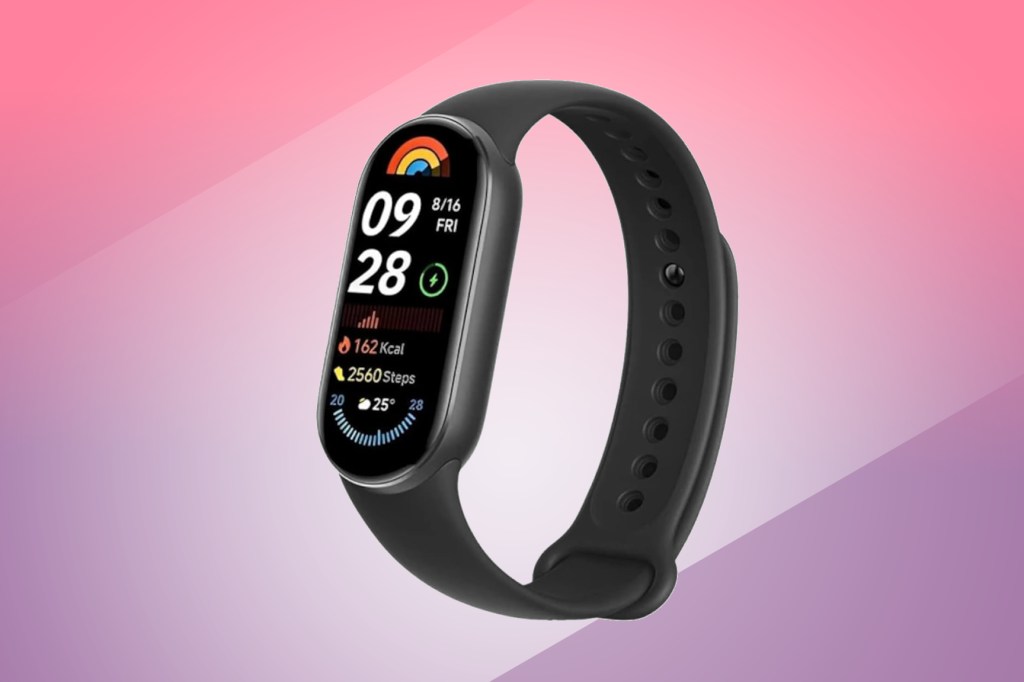
2. Xiaomi Mi Band 9
Stuff Verdict
A cheap and cheerful fitness tracker with a surprising number of features for the price
Pros
- Affordable price
- Good array of sensors
Cons
- Not the smartest tracker out there
- No 3rd party app support
| Xiaomi Mi Band 9 specs | |
|---|---|
| Screen | 1.62 inch AMOLED Touch Display, 192 x 490 pixels |
| Battery life | 21 days |
| Water resistance | 5ATM |
| GPS | No |
| Sensors | 6-axis sensor, Dual-channel PPG biosensor with heart rate and SpO2 monitoring |
| Compatibility | Andoird and iOS |
| Weight | 13.5g / 0.47 oz |
The Xiaomi Mi Band 9 is an ultra-affordable fitness tracker that’s perfect for those on a budget. Despite its low price, it still packs an impressive range of health and fitness tracking features. We’re big fans of its sleek, minimalistic design and even bigger fans of its exceptional battery life – lasting up to an incredible 21 days on a single charge.
Beyond its affordability and longevity, the Mi Band 9 delivers accurate tracking for daily activities, including steps taken, calories burned, and sleep monitoring. It also includes heart rate and SpO2 tracking, making it a well-rounded choice for basic health insights. Naturally, at this price point, it skips some premium features like built-in GPS and personalised coaching, but given its budget-friendly nature, that’s an understandable trade-off.
Overall, the Mi Band 9 offers outstanding value for money and is an excellent choice for anyone looking for a simple, reliable fitness tracker to kickstart their fitness journey. If you want an easy way to stay on top of your daily activity without spending a fortune, this is one of the best options out there.
Best fitness tracker for athletes
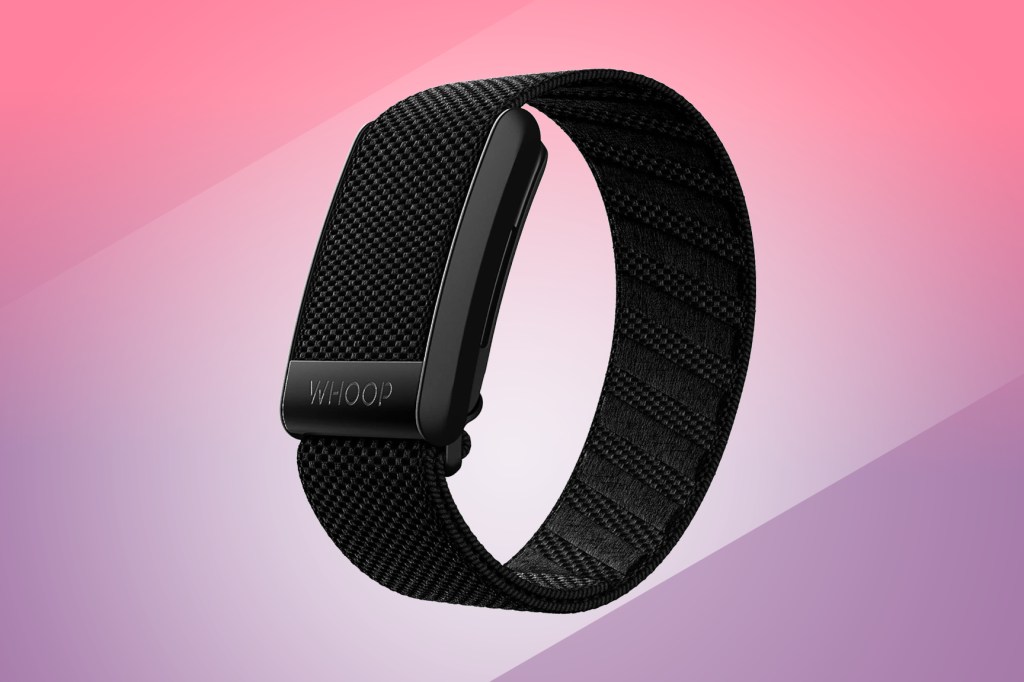
3. Whoop
Stuff Verdict
The Whoop is a premium fitness tracker designed for serious athletes, offering 24/7 strain, recovery, and sleep tracking—with no screen, a sleek design, and in-depth analytics to optimise performance.
Pros
- No screen means zero distractions
- Decent battery life
- 24/7 insights
Cons
- Useless without pricey subscription
| Whoop specs | |
|---|---|
| Screen | N/A |
| Battery life | 5 days |
| Water resistance | 5 ATM |
| GPS | No |
| Sensors | Accelerometer, Heart rate, Pulse Oximeter (SPO2), Skin Temperature Sensor |
| Compatibility | Android and iOS |
| Weight | 16 g / 0.56 oz |
The Whoop is unlike any other fitness tracker we’ve used – it’s not just about counting steps or checking your heart rate. Instead, it focuses on optimising your recovery, training, and sleep with in-depth data and personalised insights. There’s no screen, no distractions – just a sleek, comfortable band that tracks everything 24/7. We love that it helps us understand when to push harder and when to rest, something most fitness trackers overlook.
Its strain and recovery tracking are game-changers, especially for athletes or anyone serious about performance. The detailed sleep analysis is another highlight, showing how well you’re actually recovering.
The (rather expensive) subscription model means it’s not the cheapest option, but if you’re serious about optimising your fitness and well-being, it’s worth it. It also means constant updates and improvements.
Really, Whoop is more than a tracker – it’s a coach on your wrist.
Best Garmin fitness tracker
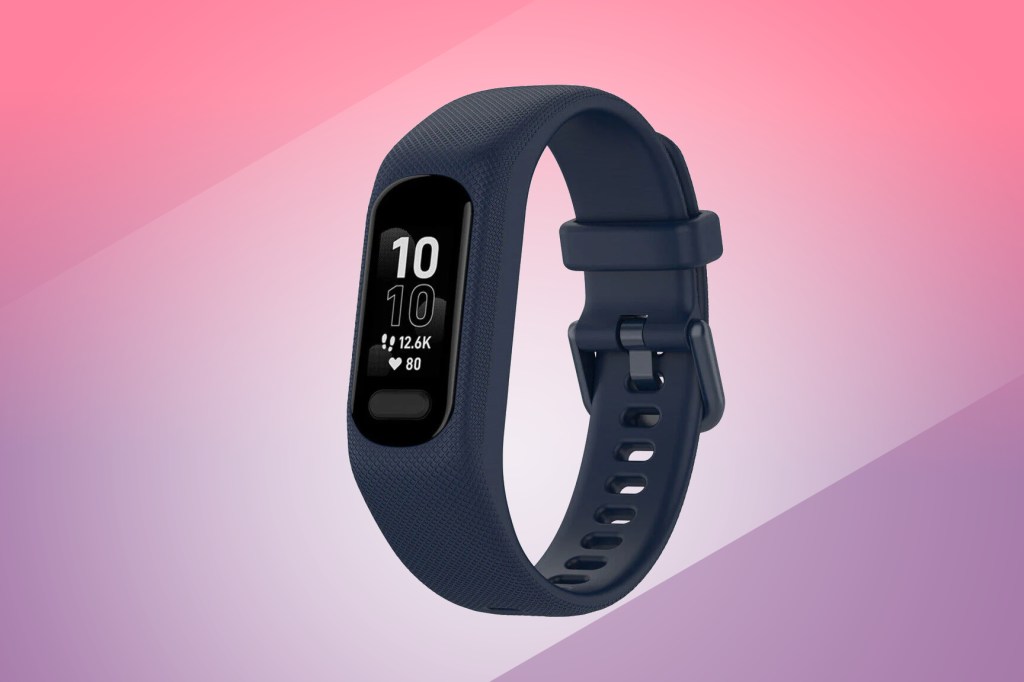
4. Garmin Vivosmart 5
Stuff Verdict
Its lightweight design might be forgettable, but if you can deal with the dinky screen and lack of built-in GPS, the Vivosmart 5 offers a lot of tracking smarts for a relatively affordable price
Pros
- Lightweight, comfortable fit
- Streamlined, swappable design
- Comprehensive tracking features
Cons
- Underwhelming display
- Slightly fiddly interface
| Garmin Vivosmart 5 specs | |
|---|---|
| Screen | 0.41×0.73in OLED touchscreen, 88×154 pixels |
| Battery life | 7 days |
| Water resistance | 5ATM |
| GPS | No |
| Sensors | Heart rate, blood oxygen, accelerometer, ambient light |
| Compatibility | Android and iOS |
| Weight | 24.5g / 0.86 oz (small), 26.5g / 0.93 oz (large) |
If you’re after Garmin’s excellent fitness tracking app’s features but don’t want to spring for one of its pricey watches, then we think something like the Vivosmart 5 could be the ideal solution. It’s pretty smart, as far as fitness tracking bands go, thanks to a pared-back design and textured rubber shell.
Feature-wise, it ticks most boxes, including the usual fitness and sleep-tracking skills, along with a pulse oximeter, stress tracker, and Garmin’s body battery energy monitor. The addition of smartphone notifications and music controls also lends it some smarter functionality, without entering full smartwatch territory.
In our review, we found the battery life is decent, if not great, with around 7 days of use per charge on offer. If you’re set on using Garmin’s well-established app, then this could be one of the best entry points before potentially upgrading to something more fully-featured in future.
- Read more: Garmin Vivosmart 5 review
Best cheap Fitbit
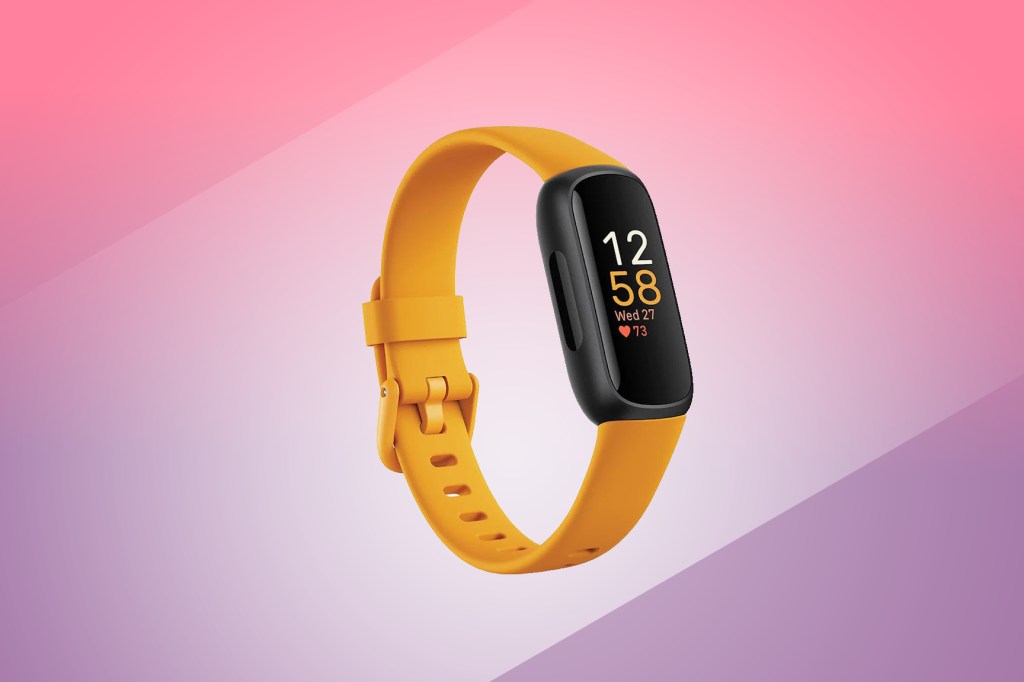
5. Fitbit Inspire 3
Stuff Verdict
Comfortable, and with a new colour screen, the Fitbit Inspire 3 means maybe you don’t need a smartwatch.
Pros
- A colour screen (finally)
- Great sleep tracker
- Best battery life on a Fitbit
Cons
- Some insights require Fitbit Premium
- It’s a small display
| Fitbit Inspire 3 specs | |
|---|---|
| Screen | 72x128px AMOLED |
| Battery life | 10 days |
| Water resistance | 5ATM |
| GPS | No |
| Sensors | 3-axis accelerometer, optical heart rate monitor, red and infrared sensors for blood oxygen (SpO2) monitoring, ambient light sensor |
| Compatibility | Android and iOS |
| Weight | 17.7 g / 0.62 oz |
With a great battery life, minimal-yet-smart design, and a price that’s at the more affordable end of Fitbit’s lineup, the Inspire 3 has plenty going for it.
Sure, you won’t get more advanced features like sweat-based stress tracking or GPS for phone-free runs, but if you want to enter the world of Fitbit’s tried and tested ecosystem while tracking activities, sleep, steps and more, the Inspire 3 won’t let you down.
- Read more: Fitbit Inspire 3 review
Best hybrid fitness tracker
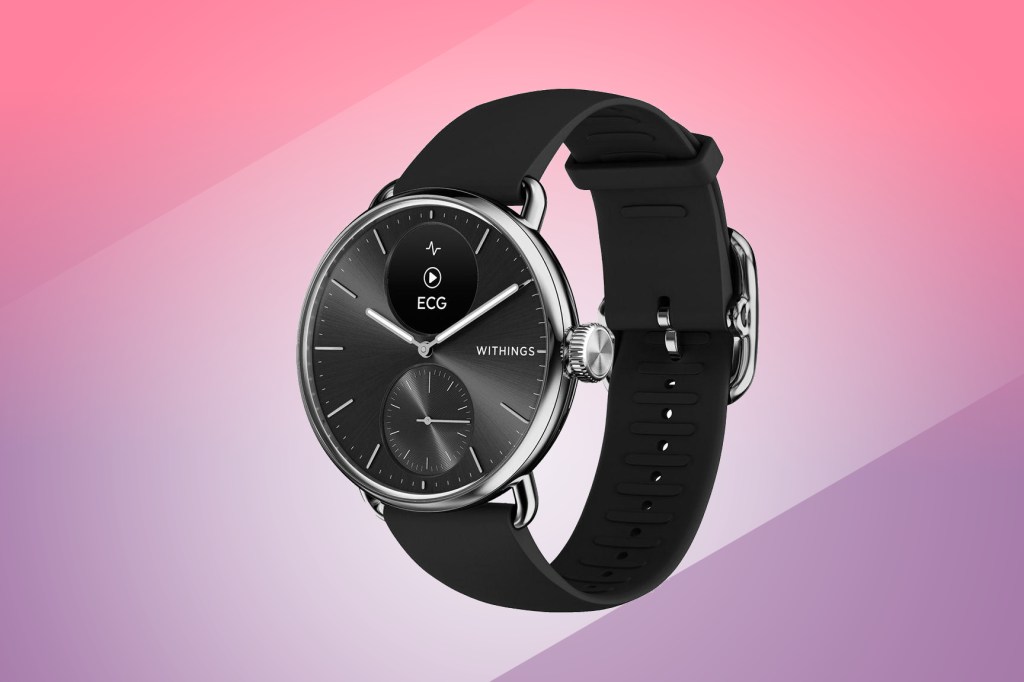
6. Withings ScanWatch 2
Stuff Verdict
A fitness tracker for analogue watch fans, the subtle ScanWatch 2 will track everything from steps to oxygen saturation, ECG and temprature.
Pros
- Great design for analogue fans
- Impressive battery life
Cons
- Not much information displayed on device
- Notifications are a little pointless
| Withings ScanWatch 2 specs | |
|---|---|
| Screen | Analogue dial + small PMOLED screen |
| Battery life | 30 days |
| Water resistance | 5 ATM |
| GPS | No |
| Sensors | Multi-wavelength PPG heart rate/SpO2 sensor, stainless steel electrodes, MEMS 3-axis accelerometer |
| Compatibility | Android and iOS |
| Weight | 58g / 2 oz (38mm), 83g / 2.9 oz (42mm) |
We’re big fans of the Withings ScanWatch 2, as it continues the brand’s unique approach to blending fitness tracking, smartwatch functionality, and classic timepiece design. With its traditional analogue face and discreet built-in display, it delivers the charm of a conventional watch while packing advanced health-tracking features, including an ECG sensor, SpO2 monitoring, body temperature tracking, and sleep apnea detection. This makes it one of the most comprehensive hybrid smartwatches on the market.
Alongside these advanced health metrics, it offers 24/7 activity tracking, heart rate monitoring, and in-depth sleep analysis, making it a fantastic choice for fitness enthusiasts who prefer a more understated look.
And thanks to the lack of a large, power-hungry display, it boasts an exceptional battery life of up to 30 days on a single charge—putting most other smartwatches to shame. If you want cutting-edge health insights without sacrificing style, the ScanWatch 2 is an easy recommendation.
- Read more: Withings ScanWatch 2 review
Best smart ring
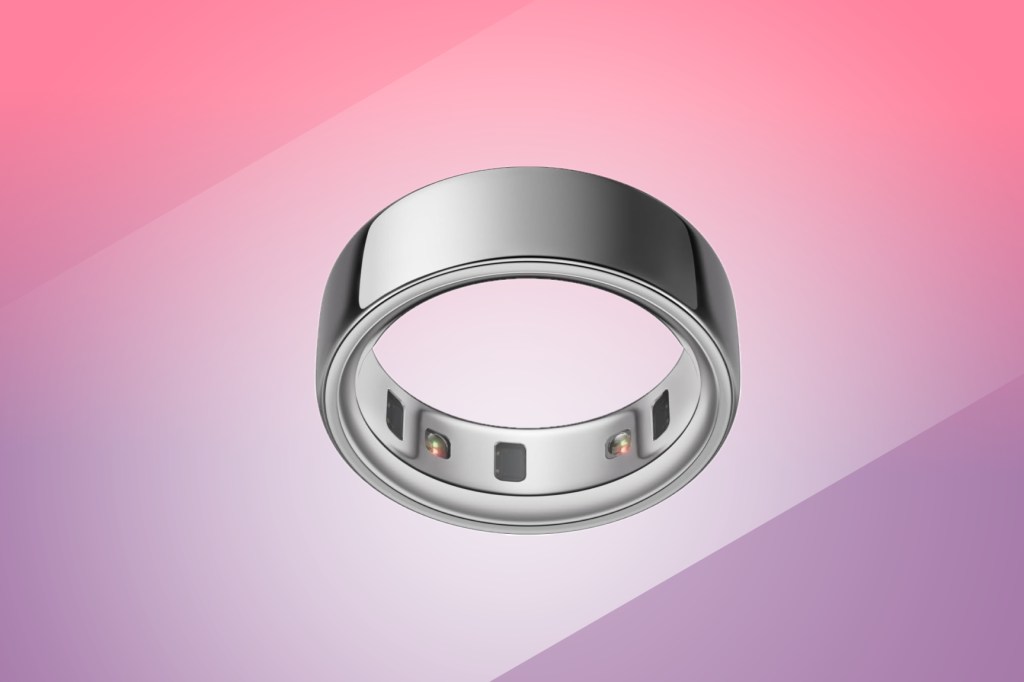
7. Oura Ring Gen 4
Stuff Verdict
The Oura Ring is a sleek, screen-free wellness tracker that delivers advanced sleep, recovery, and activity insights—helping you optimise your health effortlessly and stylishly.
Pros
- Gives an overall view of health, rest and recovery
- Comfortable to wear all day
- Advanced tracking such as SpO2 and menstrual cycle
Cons
- Much chunkier than a traditional ring
- Not the best for proper workout tracking
| Oura Ring Gen 4 specs | |
|---|---|
| Screen | N/A |
| Battery life | Up to 8 days |
| Water resistance | 100m / 300ft |
| GPS | No |
| Sensors | Optical heart rate sensor, blood oxygen, infrared photoplethysmography (PPG), skin temperature sensor, photodiodes, 3D accelerometer |
| Compatibility | Android and iOS |
| Weight | 4 – 6 g (depending on ring size) / 0.14 – 0.17 oz |
Want a fitness tracker but don’t want to clutter your wrist and/or sacrifice your beloved traditional timepiece? Enter the Oura Ring — a fitness tracker that’s cleverly incorporated into an honest-to-goodness ring, letting you wear it on your finger of choice for unintrusive tracking.
A significant upgrade over its predecessor, the Oura Ring Gen 4 refines an already impressive design with enhanced health-tracking capabilities. It now features an upgraded heart rate sensor for more accurate readings, seven temperature sensors for improved wellness insights, and a new SpO2 sensor to monitor blood oxygen levels.
Despite its discreet, ring-style form factor, the Oura Ring Gen 4 offers powerful tracking for sleep, recovery, and daily activity. It provides in-depth sleep analysis, stress monitoring, and personalised readiness scores, making it an excellent tool for optimising overall well-being. With its lightweight, durable design and up to a week of battery life, it’s a hassle-free alternative to traditional fitness wearables.
If you want a fitness tracker that blends seamlessly into your lifestyle—without a screen or bulky design—the Oura Ring Gen 4 is one of the smartest, most stylish choices available.
How to choose the best fitness tracker for you
Overwhelmed by the vast choice of fitness trackers out there? Fear not, for Stuff’s wearable experts are on hand to grace you with their expertise.
The first step is deciding on a form factor — we’ve gone mostly for more minimalist “band”-type trackers, as they’re fitness-focused rather than offering all the apps, bells, and whistles served up by, say, some of the best Android smartwatches. That’s not to say you can’t opt for a smartwatch, mind. In fact, we’ve included the likes of the Apple Watch SE above as it’s a great choice for iPhone users looking for fitness tracking and other smarts in one device.
For the most part, though, you’ll want something compact, thin, and light, with a smartwatch-beating battery life of around five days or more. Waterproofing is a must if you’re swimming, and practically every fitness tracker is weather/sweat-resistant at the very least, for obvious reasons.
Built-in GPS is a bonus if you’re looking to track outdoor activities without having to bring along your bulky smartphone, and other extras like music playback can come in handy for the same reason.
With most fitness trackers offering the same core experience — namely, steps counted, calories burned, heart rate, sleep tracking, activity tracking, and more, you’ll want to decide on which brand you feel most comfortable with. Some fitness trackers offer more comprehensive stats for particular sports like swimming, and if you’ve already got a device from a particular brand, you may want to stay within their ecosystem so that you don’t lose any of your existing app data.
If you’re interested in exploring more, check out our guides on the best kids’ fitness trackers and the best budget fitness trackers.
Finally, if you’re serious about getting fit, check out Stuff’s guide to the best GPS watches.
Fitness trackers vs smartwatches
Fitness trackers and smartwatches both offer fitness tracking, but they serve different needs. Fitness trackers are typically smaller, lighter, and designed primarily for health monitoring. They focus on essentials like step counting, heart rate tracking, sleep analysis, and sometimes SpO2 and stress monitoring. Many fitness trackers also have longer battery life, often lasting a week or more.
Smartwatches, on the other hand, combine fitness tracking with a wider range of features, including notifications, apps, and sometimes even music storage or phone calls. They often have built-in GPS for precise workout tracking and larger, interactive displays. However, they tend to be bulkier and require more frequent charging—sometimes daily.
If you want a simple, dedicated fitness tracker with minimal distractions and long battery life, a fitness band is ideal. But if you prefer an all-in-one device that blends fitness with smart features, a smartwatch might be the better choice (read Stuff’s guide to the best smartwatches).
Which fitness tracker has the best health app?
While each fitness tracker app has its strengths, we think Oura arguably offers the best overall health app – especially if you care more about recovery and long-term well-being than step counts and sweaty HIIT sessions.
The Oura app is slick, calming, and obsessively detailed. It’s less “rah-rah” motivation and more “here’s how your body’s really doing” – tracking sleep stages, readiness, heart rate variability, body temperature, and even stress with impressive accuracy. You get personalised insights without being bombarded by pushy alerts.
Fitbit’s app is more fitness-focused, gamified, and social. Garmin’s excels for performance stats and sports, though its interface is more utilitarian. Whoop is great for athletes, but its app can feel a bit intense if you’re not chasing PBs daily.
So, for thoughtful, science-backed health insights wrapped in a beautifully chill app experience, Oura leads the pack – especially if you like tracking, not just training.
How we test the best fitness trackers
We have used and reviewed every fitness tracker on this list, so you can trust us when it comes to recommending the best ones to buy. With years of hands-on experience with countless trackers, we ensure that our recommendations are reliable and well-informed. Each fitness tracker meets the high standards we set for performance, usability, and overall value.
We typically spend a week or longer using these fitness trackers, wearing them 24/7 to thoroughly evaluate all their features, design, and accuracy. This extended period allows us to experience the tracker as an average user would, identifying both strengths and weaknesses that may not be immediately obvious from a quick hands-on. Our testing process is designed to uncover how well the device performs under various conditions.
Our reviews are comprehensive, covering all aspects of a fitness tracker, including activity tracking accuracy, battery life, comfort, and ease of use. We test tracking capabilities across various exercises and activities to provide an accurate picture of real-world performance. Battery life is evaluated under different usage scenarios, while comfort and usability are tested through daily wear. By reviewing these key elements, we aim to give you a complete understanding of each tracker’s capabilities, helping you make an informed purchasing decision.
For more information on Stuff’s rating and review process, feel free to read our page on how we test products.

